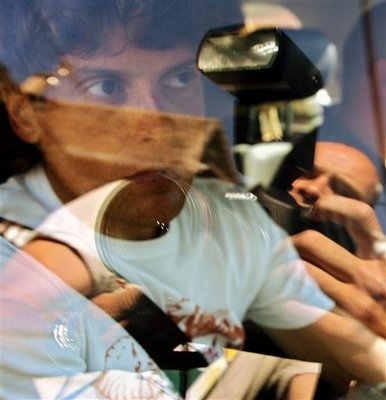 |
TOP - One of the watering stations (mile marker 52) – BOTTOM - One of the six one gallon bottles of water – Contents maintained by____(?) in the blue drum watering stations found along the westside of southern most part of a 15 mile stretch of San Diego County road “S2” inside Anza Borrego Desert (California) State Park. Image Credit: Edmund Jenks (2006)
|
S2 Mile Marker Mystery Tour – follow-on #1
As for the
S2 Mile Marker Mystery Tour, the research is by no means complete … but I have found a few clues.
The mile marker mystery source – ie. the large blue drums that contain approximately six, one gallon sealed containers of water resourced from the
Borrego Springs Bottled Water – may be an immigration support organization that goes by the name “Border Angels”.
I was watching a local news special by the title
“State Divided” on KNBC-4 (July 4, 2006 – 5:00 PM) and the founder of the
Border Angels, Enrique Morones was interviewed. What he stated as the purpose and the cause of the organization seemed to match up with the effort required to place and maintain these watering stations.
A Google search was enjoined and turned up the following information:
The following excerpt is from Indy Media –
Saving Peoples’ Lives: Border Angels At Work’, Special Guest: Enrique Moronoes.
By Indy Media
“Since the advent of Operation Gatekeeper and the installation of the steel wall at the Border in 1994, migrant persons have been forced to move through the perilous mountain and desert areas of Imperial Valley. Since October of 1994, 2,750 migrant persons have died and thousands more are ill or missing. Enrique Morones founded the Border Angels, a non-profit organization of extraordinary individuals, to help prevent the unnecessary deaths of these migrant persons. Along with other groups, the Border Angels have set up rescue stations with water, food, and blankets in the most hazardous areas of Imperial Valley.”
Read All>>
This led to looking into the Border Angels website and to the "LETTERS" page.
Excerpts and edits from Border Angels -
LETTERS
By Louis Vilml
In 1985 while the U.S. and Soviet Union was competing for the hearts and minds of the non-aligned nations, President Reagan stood in front of the Berlin Wall, the symbol of a divided Europe, and said ‘General Secretary Gorbachev, if you seek peace, if you seek prosperity for the Soviet Union and Eastern Europe…tear down this wall’.
At home Mr. Reagan had launched the largest peace-time military budget in U.S. history spending 2.4 trillion dollars including the infamous SDI-the placing of weapons in outer-space.
American politicians are renowned for their double standards. Worshipping at the altar of self-righteousness and superiority brings out the worst in the areas of denial and contradictions. Supremacy breeds fear and insecurity while words do not reflect action.
From the European colonization of North America, where newly arrived settlers displaced millions of the indigenous populations by building fences, forts, and reservations, to the deadly and warlike trade embargoes against such countries as Japan, China, Cuba, Libya, Iraq, Iran, and North Korea, the U.S. has become enslaved to a vast network of bulwarks and military complexes.
This fortress mentality trickles down and spans across America to the thousands of high-tech security and gated communities in which every home has a ’panic room‘.
Several of America’s foremost politicians are now leading the charge to build a parallel multi-billion dollar, two-thousand mile long fence between Mexico and the U.S. President Fox is right in claiming the fence would be disgraceful and shameful to the people of Mexico.
Unfortunately, past and present U.S. policy makers have erected other walls that still remain hidden to this day.”
----
As a result of 9-11, the mantra by the Bush Administration is that security is the means by which America will achieve fundamental freedoms.
On the contrary, intelligence, economic justice for all, and cooperation with other countries is the means by which the U.S. will achieve fundamental freedoms.
On 9-11, the terrorists did not attack the Statue of Liberty. They attacked the Pentagon, WTC, and attempted to attack Washington DC where the U.S. government resides.
The terrorists do NOT dislike our freedoms but instead abhor the U.S. for its foreign militarism, violent interventions, destructive economic policies, and an ill-advised government that is sheltered from the realities and sufferings of the underprivileged and exploited.
Therefore, it is these words and the policies on the base of the Statue of Liberty that America should continue to abide by…
Read All>>
For one who believes in the pursuit and protection of United States sovereignty, the political posture shown in the “LETTERS” section of the Border Angels website is troubling, indeed.
Back to the mystery, the one linkage I have not been able to establish, however, is the tie between the S2 Mile Marker watering stations and the "how & why" these stations exist on California State Park land and NOWHERE ELSE throughout the park (again, not just there for general park visitors).
Further, when people try to cross our borders legally at border crossing check-points, they are patted down, frisked, and asked to take off parts of their clothing, but when it comes to the rest of the border, our federal government will not put up a fence, let alone have our National Guard stationed there be allowed to touch or detain those who walk across illegally. WHY?
By myself, I am not an Army Of Davids … I am but one person with questions.
The how & why - may be an official link between the “Border Angels” and Anza Borrego Desert State Park officials.
The how & why - is that the stations may have been placed without permission by outside interests (unlikely).
The how & why - may be an official program, supported through the use of tax dollars, of the State Park to assist immigrants.
The how & why is … (?).
So, this is where the discussion of this issue and posts continue – any helpers?
 Photo Credit: China Rail by Allen Zagel
Photo Credit: China Rail by Allen Zagel 












